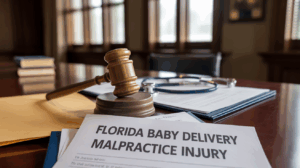
Yes, you can sue a doctor who was recommended by a hospital. A hospital’s recommendation or referral does not shield a doctor from liability for medical malpractice or negligent care.
If you’ve been harmed by a doctor in Florida who was recommended by a hospital, consulting with a Florida medical malpractice lawyer can help determine if you have grounds for a lawsuit against the doctor, and possibly the hospital as well.
Understanding Hospital-Doctor Relationships
Several types of relationships exist between hospitals and doctors:
- Hospital employees: Some physicians are directly employed by hospitals and receive salaries from the institution. These might include hospitalists, emergency room physicians, or specialists in hospital-owned practices.
- Independent contractors: Many doctors have privileges to practice at hospitals but are not employees. Instead, they have contractual relationships that allow them to admit and treat patients at the facility while maintaining their independent practices.
- Medical staff members: Physicians may be granted staff privileges at hospitals after a credentialing process, allowing them to use hospital facilities for their patients.
- Network participants: Doctors might belong to networks or groups affiliated with specific hospitals without being directly employed by them.
When a hospital recommends a specific doctor, this recommendation might occur through:
- Formal referral systems where hospital staff direct patients to certain physicians
- Hospital physician directories or “find a doctor” services
- Nurse or staff recommendations when patients request provider suggestions
- Hospital-sponsored clinics or outpatient centers staffed by affiliated physicians
Importantly, regardless of how the recommendation occurred, a doctor’s obligation to provide care that meets accepted medical standards remains unchanged. The hospital’s endorsement does not absolve the physician of responsibility to deliver appropriate care.
From a legal perspective, a hospital’s recommendation may actually create additional avenues for liability in some cases. If the hospital knew or should have known about a doctor’s history of poor care but continued to recommend them to patients, the hospital might share responsibility for resulting injuries under theories of negligent referral or credentialing.
Legal Liability For Hospital-Recommended Doctors
When a hospital recommends a doctor who subsequently provides negligent care, questions of legal liability become complex. You may be able to sue a doctor who was recommended by a hospital, as well as the hospital that hired them.
Direct Liability Of The Recommended Doctor
Regardless of how you were connected with a physician, the doctor maintains an independent duty to provide care that meets accepted medical standards. This duty exists whether the doctor was:
- Recommended by a friend
- Found through your own research
- Assigned to you during a hospital stay
- Referred by your primary care physician
- Suggested by hospital staff
A hospital’s recommendation does not reduce or eliminate this responsibility. If the doctor fails to meet the standard of care and causes harm, they can be held directly liable for medical malpractice. The fact that you came to the doctor through a hospital recommendation has no bearing on the doctor’s obligation to provide competent care.
To hold the doctor liable, you would need to prove:
- A doctor-patient relationship existed
- The doctor failed to meet the accepted standard of care
- This failure directly caused your injury
- You suffered actual damages as a result
The hospital’s role in connecting you with the doctor does not typically affect any of these elements of a malpractice claim against the physician.
Does the Hospital Share Liability?
Florida courts have recognized that hospitals can be held liable for the negligence of independent contractor physicians in some circumstances, particularly when patients reasonably believe the doctor is employed by or acting on behalf of the hospital.
The doctrine of “non-delegable duty” may also apply in some Florida cases. This principle holds that hospitals cannot escape certain responsibilities by delegating them to independent contractors.
For example, emergency room care has been considered a non-delegable duty in some cases, meaning the hospital remains responsible regardless of the employment status of the treating physicians.
Steps To Take If You Suspect Negligence
First, prioritize your health by seeking immediate medical attention from a different provider. A second opinion can address your medical needs while also documenting the harm caused by the original doctor’s care. Make sure to:
- Be honest about your symptoms and concerns
- Provide complete information about previous treatments
- Ask questions about why your condition may have worsened
- Follow all recommendations for corrective treatment
Document everything related to your care from both the negligent doctor and subsequent providers:
- Keep a detailed journal of symptoms, treatments, and conversations with medical staff
- Request and organize all medical records, test results, and imaging studies
- Save prescription information, discharge instructions, and other paperwork
- Take photographs of visible injuries or symptoms when applicable
- Maintain records of all medical expenses, including transportation to appointments
Preserve any evidence of the hospital’s recommendation or referral to the doctor:
- Emails, letters, or printed materials from the hospital
- Notes about verbal recommendations, including who made them and when
- Hospital directories or websites listing the doctor
- Marketing materials promoting the doctor’s affiliation with the hospital
- Insurance documents showing network relationships
Contact an experienced medical malpractice attorney as soon as possible. Most reputable attorneys offer free initial consultations to evaluate your case. Bring your documentation to this meeting to help the attorney assess whether you have a viable claim against the doctor, the hospital, or both.
Sue a Doctor Who Was Recommended by a Hospital With Our Help
If you’ve suffered harm due to negligence from a hospital-recommended doctor in Florida, we can help you. The Law Offices of Anidjar & Levine offers compassionate, client-focused representation with a proven track record of success in medical malpractice cases. We work on a contingency fee basis, meaning you pay nothing unless we recover compensation for you.
Contact us today for a free, no-obligation consultation to discuss your case. Our team can tell you if you can sue your hospital-recommended doctor for what you’ve experienced. Don’t wait to protect your rights. Reach out to The Law Offices of Anidjar & Levine to speak with a Florida medical malpractice lawyer who will stand by your side throughout the legal process.










